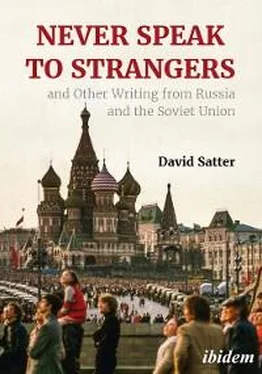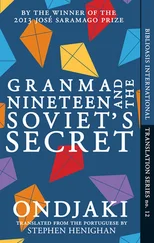There is a Stalin museum in Stalin’s birthplace, Gori, a modern town of 50,000 inhabitants set in a valley between green hills, as well as a statue of Stalin flanked by silver pine trees in front of the city hall.
In the centre of Tbilisi, the Georgian capital, streams of traffic use the Stalin embankment and on a mountain 2,000 feet above the city, children enjoy rides at the Stalin amusement park.
All this, however, probably says more about the Soviet attitude towards Georgia than about any nostalgia for Stalin.
Georgia differs from Russia historically, temperamentally and culturally, and since Stalin has been regarded as a national hero by those poorer workers who were least affected by his purges, it is apparently deemed prudent to encourage a reverential attitude to him in an attempt to tie Georgian loyalties more firmly to the Soviet state.
Just how different Georgia is from the rest of the Soviet Union becomes clear walking down Rustavelli Street, Tbilisi’s main avenue. It is lined with French baroque style buildings and spreading trees, and feels more Latin than Russian.
Beyond Rustavelli Street, Tbilisi is a city of crumbling stone buildings with iron latticework balconies and terraced Caucasian one-storey cottages on the sides of hills. The mountains which characterise the republic are visible in the distance. Much of the old city centre is preserved and Tbilisi, unlike other Soviet cities, has distinct neighbourhoods.
The atmosphere on Rustavelli Street on a typical summer night is friendly and relaxed. But the street has also witnessed striking manifestations of Georgian nationalism, as on April 14, when the largest mass demonstration in more than 20 years took place to protest against an attempt to abolish Georgian as the republic’s official language. The demonstration showed that Georgia’s accommodation to the Soviet state is potentially uneasy and requires concessions to national feelings.
The draft text of the new Georgian constitution had been published and, unlike the constitution of 1937, it contained no reference to Georgian as the official language of the republic but only granted the right to use the native language or other languages of the USSR during the “discussion” period in factories and offices prior to the formal adoption of the document. But the usual unanimous approval was not forthcoming. Heated arguments broke out, especially in academic and scientific establishments. Petitions began to circulate.
As April 14, the day when the constitution was supposed to be adopted, approached, it became obvious that thousands of people were going to gather outside the Supreme Soviet building to demand the retention of Georgian as the official language and the authorities, perhaps sensing the costs of suppressing the demonstration, acted instead to infiltrate the demonstration and direct it away from anything overtly anti-Soviet toward the one goal of reinstating the Georgian language.
There were at least 5,000, and perhaps 10,000, persons on the street on that day, halting all traffic. The situation, however, remained under control. The only placards contained quotes from Georgian classics and lines from a Georgian children’s reader. The opening of the Supreme Soviet session was delayed and the demonstration ended when Eduard Shevarnadze, the Georgian communist leader, appeared before the demonstrators and told them Georgian would be retained as the official language.
Almost all communication in Georgia is in Georgian, so the proposed constitutional change would not have, had great practical effect. The local news programme is broadcast in Georgian seven times a week, in Russian only once. The Georgian language newspaper, Kommisti, has five times the circulation of Zarya Vostoka, its Russian counterpart. There are Georgian plays, books and an active film industry.
But the retention of Georgian as the Republic’s official language is of as much symbolic significance in 1978 as 56 years earlier, in 1922, when Lenin accepted it in a “historic compromise” as part of an effort to refute claims that the Bolsheviks would eradicate Georgian culture.
The crowded, winding streets, the markets piled high with fruits, vegetables and flowers and the modish dress of Georgian young people all provide reminders that Georgia has its own distinctive character and a history far pre-dating that of Russia.
This sense of history and an awareness of its ironies may contribute to the fact that normally there is an atmosphere of easy tolerance within Georgia. There are Jewish, Armenian and Azerbaijani residential sections near the old synagogue. The Armenians sometimes irritate their neighbours by packing the Tbilisi versus Yerevan soccer games and cheering for Yerevan. But there is little real hostility among its peoples.
The fact remains, however, that Georgia, with its flourishing agriculture, its history, language and culture, has all the attributes of an independent nation but exists only as a compartment of the Russian-dominated Soviet state.
The Soviet system offers a Marxist-Leninist substitute for most of the components of any traditional culture. Atheism is a substitute for traditional religion, dialectical materialism replaces national history and socialist ideology sets limits on cultural expression. That leaves language as the pre-eminent symbol of national identity.
The impossibility of changing the situation, and the Soviet skill in placating the Georgians with national symbols and timely concessions seem to have created a mood of resigned cynicism. The Georgians, who make up 70 per cent of the republic’s population, make the best of the situation: “There are few active dissidents but everyone ‘thinks differently.’ No one believes what he reads in the newspaper,” as one Georgian intellectual put it.
Georgian culture is not free to establish its own character any more than is the national culture in the other non-Russian republics. The language issue which provoked the Tbilisi demonstration on April 14 has great symbolic importance elsewhere. But in each republic there are different points of conflict between socialist ideology and native traditions. In Lithuania, for example, the intensity of national feeling stems in part from the Soviet suppression of the Catholic religion. In Georgia there is, in addition to general cultural resentment, a specific resistance to the rigidities of the planned economy.
Soviet citizens elsewhere uncharitably attribute a penchant for corruption to the Georgians. In some cases, it could just as easily be described as impatience with centralisation and a persecuted talent for private enterprise.
In the live and let live atmosphere which prevailed before the accession of Mr. Shevarnadze in 1972, the living standard in Georgia was reputedly the highest in the Soviet Union. It may still be. A not inconsiderable portion of the wealth is derived from the unofficial but highly organised purchase of fruits, flowers and vegetables and their resale in northern cities.
The practice has been mostly brought under control, partially because of the Government’s decision to pay higher prices to farmers for their produce. But it has not been eliminated.
The Press is full of stories about speculators being caught trying to smuggle fruit out of Georgia or manufacturing bootleg liquor in their bathtubs. Recently, three lorries full of fruits and vegetables and protected by armed guards were stopped at the border between Georgia and the Russian republic by a night patrol.
The crackdown on corruption in Georgia was initiated by Mr. Shevarnadze after he replaced the former Georgian communist leader, Mr. Vasily Mzhavandze. Thousands of Georgian officials were fired or deprived of their influence and tough penalties began to be meted out to bribe takers and black market operators. One response was a series of fires and bombings, beginning with the torching of the Tbilisi opera house in 1974 and culminating in the bombing of the Council of Ministers’ building in 1976 for which a man was reportedly shot.
Читать дальше












